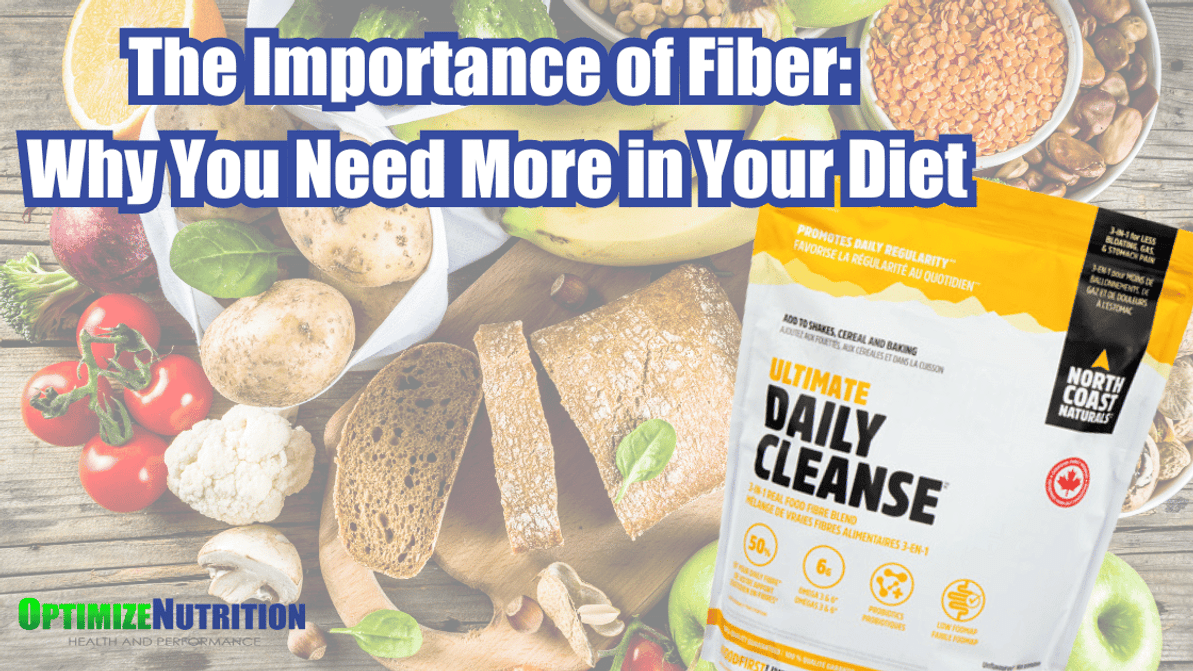The Importance of Fiber: Why You Need More in Your Diet
In today's fast-paced world, nutrition often takes a back seat to convenience. One crucial but often overlooked component of a healthy diet is fiber. This blog explores the importance of fiber, its benefits, and practical ways to incorporate more of it into your daily diet.
What is Fiber?
Fiber is a type of carbohydrate found in plant-based foods that the body cannot digest. Unlike other carbs, fiber passes through the digestive system relatively intact. There are two main types of dietary fiber:
- Soluble Fiber: Dissolves in water to form a gel-like substance, helping lower blood cholesterol and glucose levels. Foods rich in soluble fiber include oats, beans, fruits, and vegetables.
- Insoluble Fiber: Does not dissolve in water, aiding in moving material through the digestive system and increasing stool bulk. Good sources include whole grains, nuts, beans, and vegetables.
The Benefits of Fiber
Promotes Digestive Health: Adds bulk to stool, making it easier to pass and reducing the risk of constipation and other digestive issues.
Controls Blood Sugar Levels: Slows the absorption of sugar, which is particularly beneficial for people with diabetes.
Lowers Cholesterol Levels: Reduces the absorption of cholesterol into the bloodstream, lowering LDL (bad) cholesterol levels.
Aids in Weight Management: High-fiber foods are more filling, helping control calorie intake and support weight loss efforts.
Supports Heart Health: Reduces blood pressure, inflammation, and other heart disease risk factors.
Improves Gut Health: Acts as a prebiotic, feeding beneficial gut bacteria, which improves immunity and overall health.
How Much Fiber Do You Need?
- Women: 21 to 25 grams per day
- Men: 30 to 38 grams per day
Most people fall short of these recommendations, so increasing fiber intake gradually can help prevent digestive discomfort.
Easy Ways to Add More Fiber to Your Diet
Start Your Day with Whole Grains: Choose whole-grain cereals, oatmeal, or whole-grain toast.
Incorporate More Fruits and Vegetables: Aim for at least five servings per day.
Choose Legumes: Add beans, lentils, and peas to soups, salads, and stews.
Snack on Nuts and Seeds: High in fiber and healthy fats, they make a great snack.
Switch to Whole Grains: Opt for brown rice, quinoa, whole-wheat pasta, and whole-grain bread.
Read Labels: Choose products with higher fiber content.
Should You Consider Fiber Supplements?
While it's best to get fiber from whole foods, supplements can help meet daily requirements. Here’s what you need to know about fiber supplements:
- Convenience: Easy and convenient, especially for those with busy lifestyles.
- Digestive Health: Helps manage issues like constipation, diarrhea, and IBS.
- Heart Health: Some, like psyllium, help lower cholesterol.
- Blood Sugar Control: Slows sugar absorption, aiding in control.
Effective Use:
- Start Slowly: Begin with a lower dose and gradually increase.
- Stay Hydrated: Drink plenty of water to help fiber work properly.
- Balance with Whole Foods: Aim to include a variety of fiber-rich whole foods in your diet.
- Consult a Healthcare Provider: Especially if you have health conditions or take medications.
Product Highlight: North Coast Naturals Daily Cleanse
This comprehensive fiber supplement combines multiple fiber sources, essential fats, and probiotics:
Ingredients:
- Ground 100% Canadian Flax Seed: Rich in omega-3s and both soluble and insoluble fiber.
- Psyllium Seed Husk: Primarily soluble fiber, helps bulk up stool and ease constipation.
- Organic Quinoa Powder: Provides both types of fiber and essential amino acids.
- Organic Chia Seed Powder: High in omega-3s and fiber.
- Organic Pumpkin Seed Powder: Rich in insoluble fiber, magnesium, and zinc.
- Organic Sprouted Brown Rice Powder: Easier to digest and rich in insoluble fiber.
- Probiotics: Bacillus subtilis DE111® and Lactobacillus fermentum support gut health.
Benefits:
- Fiber: 14 g per serving (50% of daily requirement)
- Omega-3 & 6 Fats: 6 g
- Probiotic Fortified: Supports gut health
- Low FODMAP: Suitable for those with IBS
Usage: Mix 1-2 servings into cereal, yogurt, smoothies, or shakes. Suggested use is 2 servings per day.
Buy online > Here!
Conclusion
Fiber is essential for digestive health, heart health, and overall well-being. By incorporating more fiber-rich foods into your diet and considering supplements when necessary, you can enjoy the numerous benefits fiber offers. Start making healthier choices today by adding more fiber to your diet.
Recent Posts
-
Beat the Winter Blues: A Nutritionist’s Guide to Managing Seasonal Affective Disorder Naturally
As the days get shorter and temperatures drop, many people notice changes in mood, energy, sleep, an …Dec 12, 2025 -
Back to School: Sharpen Focus, Energize Learning
As the school season kicks off, it’s the perfect time to set students up for success—not just with s …Sep 02, 2025 -
Is Apple Cider Vinegar Really Good for You?
Exploring the Benefits of ACV (Featuring Filsingers Organic Apple Cider Vinegar & Suku Vitamins Appl …Jul 18, 2025




